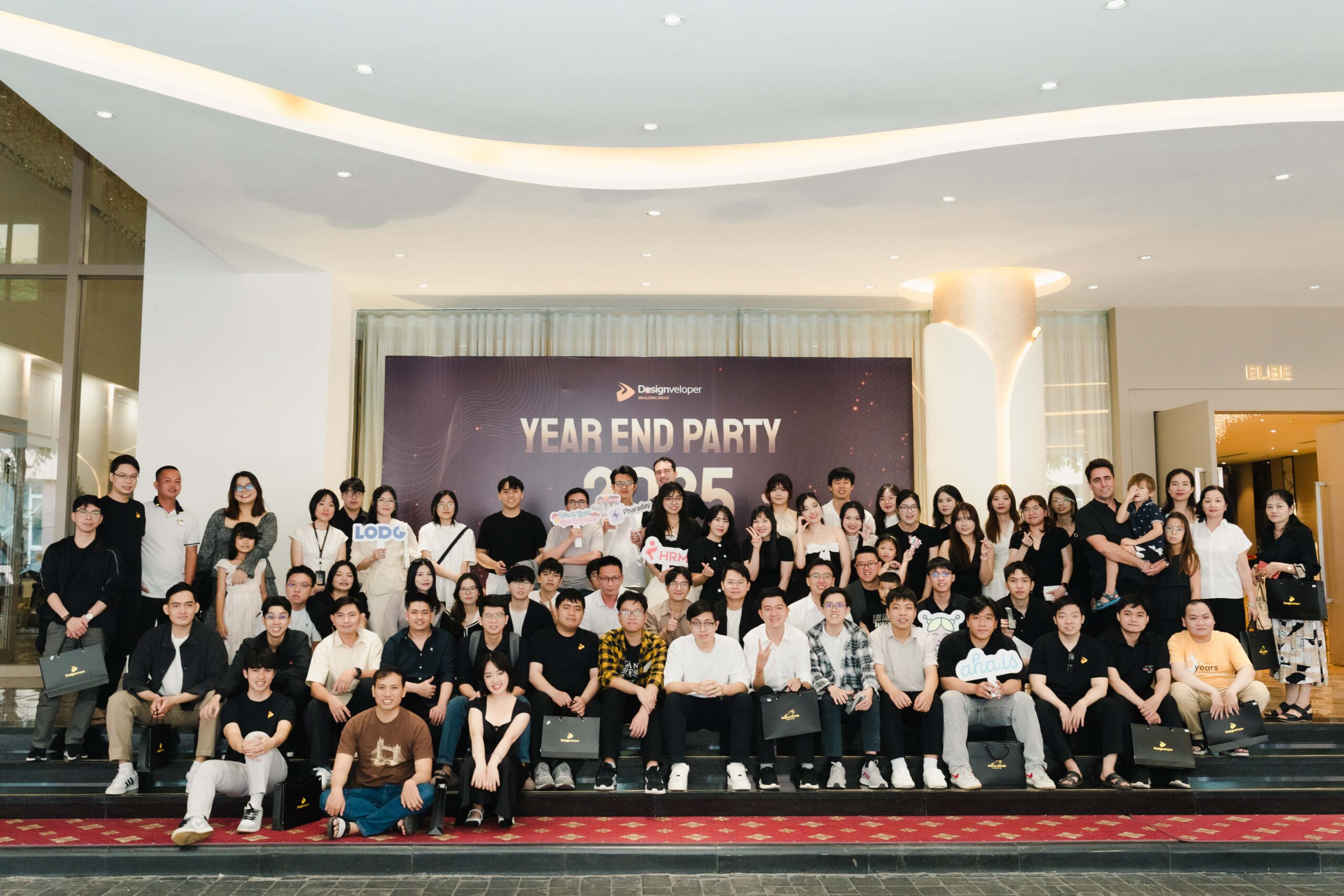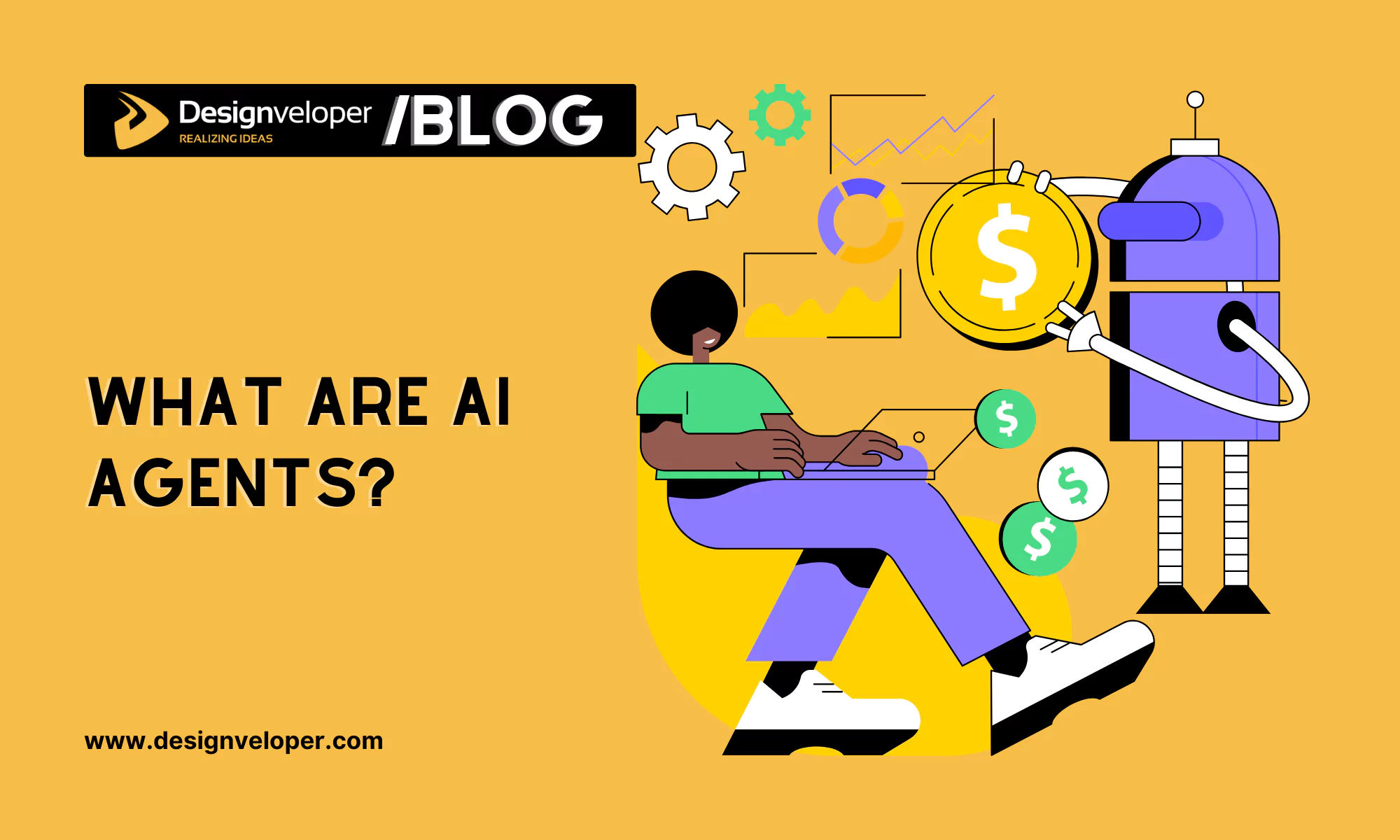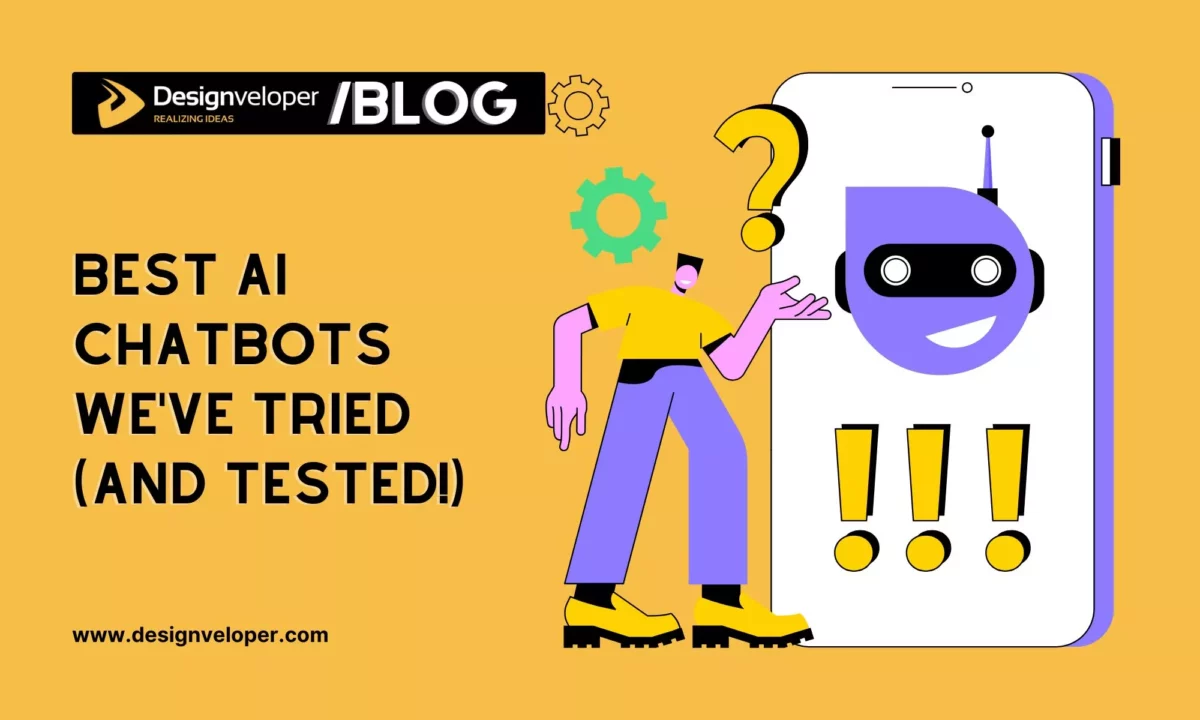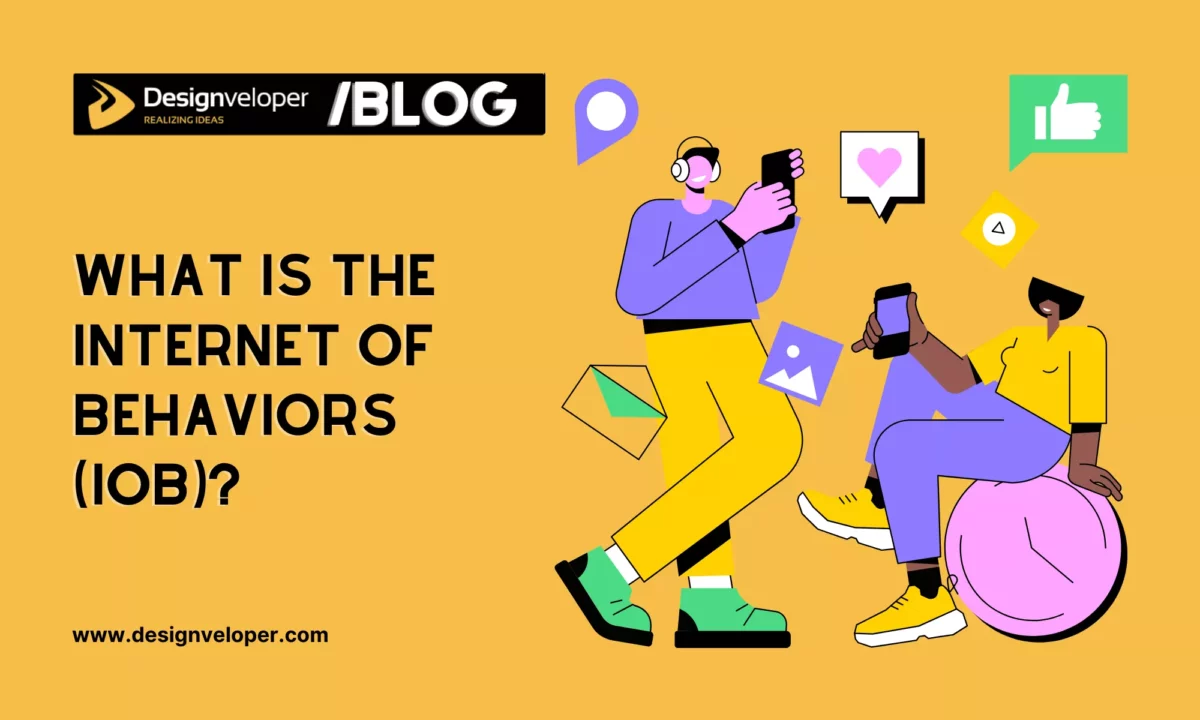
The use of AI agents is changing the way automation is being done in various industries. These smart programs are independent and do their work and make decisions as a human being. The interest in AI agents reached new heights in 2025. Many business leaders now ask, what are AI agents and how can these tools revolutionize their operations? This article decomposes the idea, gives new statistics and examples, and explains why AI agents are the core of contemporary automation.
What Are AI Agents?
AI agents are smart software agents that can autonomously sense, reason and act to accomplish a given goal. Simply put, an AI agent monitors its surroundings, decides and acts without continuous human supervision. These agents focus on goals and they employ the artificial intelligence methods to determine the most appropriate method of achieving their goals. They could use large language models, data analysis, or other AI tools to design and execute complicated tasks.

It is useful to compare AI agents to ordinary software or simple bots. Traditional software performs a set of instructions and only reacts to direct inputs. In comparison, an AI agent is able to change its behavior depending on the situation and experience. As an example, a basic chatbot gives scripted answers to questions. An AI agent, however, is able to learn with every interaction and get better with its responses. It does not merely respond, but it takes initiatives to achieve its objectives. It is this that renders AI agents as the next step of automation.
AI agents vs. AI assistants: You might have heard of AI assistants such as voice assistants or customer service chatbots. A more sophisticated one is AI agents. A standard chatbot (an AI assistant) is usually responsive, i.e., it waits until the user commands it and acts according to the pre-determined conversation flow. Conversely, an AI agent is able to make independent choices and take actions in order to achieve a goal without specific instructions. That is, assistants are concerned with user interaction and agents with the realization of outcomes. This distinction implies that AI agents can perform more complex and autonomous tasks than conventional assistants.
FURTHER READING: |
1. How to Build an Application Like ChatGPT: A Full Guide |
2. Can ChatGPT Really Build an App? What ChatGPT Can & Cannot Do |
3. What Is GraphRAG? Knowledge Graphs for LLMs |
How Do AI Agents Work?
The AI agents work based on perceive, decide, and act cycle. To begin with, the agent observes its surroundings. This may imply reading data, sensing inputs, or watching user behavior. The agent collects data in the same way a human being would view a scenario. Then the agent makes a decision on a plan with the help of its brain, which is an AI model or algorithm. It analyses the information, considers the available options, and decides what to do depending on its objectives. Lastly, the agent is the one who performs actions or delivers outputs. It may trigger a message, press a button within a software system or call an API to cause something to occur.
The latest AI agents usually have more complex AI models to drive their decision-making. A lot of them use Large Language Models (LLMs) as their reasoning engine. The LLM is the brain of the agent, which allows human-like comprehension and planning. An AI agent with an LLM could divide a complex problem into steps and determine the solution in a similar way to how a person would go about solving a problem. As an example, when you request an AI agent to schedule a meeting, it will be able to understand your request, consult calendars, issue invitations, and manage conflicts, by reasoning about each sub-task. This ability to think and take several actions is characteristic of AI agents.
Key Capabilities of AI Agents Include
- Autonomous Decision-Making: AI agents make choices without needing a human to approve every step. They use AI algorithms to weigh options and choose actions that move toward their goal. For example, a logistics AI agent can reroute deliveries on the fly if it detects a traffic jam, all on its own.
- Continuous Learning: Many AI agents can learn from the results of their actions. If an approach fails, the agent can adjust its strategy next time. This learning might come from machine learning models updating with new data or simple feedback loops that correct mistakes. The result is that agents get better and more accurate as they gain experience.
- Tool Use and Integration: AI agents often integrate with various software tools, databases, or APIs to complete tasks. A sales AI agent might plug into a CRM system to log calls or use an email API to send follow-ups. They effectively extend their reach by using these tools, which allows them to operate in digital environments (and even physical ones, in the case of robotics). For instance, some AI agents can control IoT devices or trigger robotic machinery as part of their actions.
- Real-Time Adaptation: Unlike static programs, AI agents can adapt in real time. They constantly assess new information from their environment. If conditions change or unexpected data comes in, the agent can change its course. Imagine an AI trading agent: if the market suddenly shifts, the agent can pause or alter its strategy within seconds. This responsiveness is crucial in fast-paced settings.
Is ChatGPT an AI Agent?
Many readers wonder if ChatGPT counts as an AI agent. ChatGPT is a conversational AI assistant that needs a prompt to start. It answers questions and generates text. It does not plan tasks or trigger actions on its own. IBM explains that ChatGPT is an AI assistant that stays reactive and waits for user commands. This places ChatGPT one step below a full AI agent. Developers can wrap ChatGPT inside an agent framework. They add memory, tool use, and goal planning. However, when combined, ChatGPT becomes the language engine of a larger agentic stack. On its own, though, it lacks true autonomy. Gigabuddy notes that ChatGPT has no independent action and remains passive by design. In short, ChatGPT is not an AI agent out of the box, but it can power one.
FURTHER READING: |
1. What Is a Chatbot and How Does It Work? |
2. 10 Best AI Chatbots in 2025 |
3. What is Voice Technology? Definition and Examples |
Applications of AI Agents in Modern Automation
AI agents are popular across industries to automate processes, enhance efficiency, and even unlock new capabilities. Below are some key areas where AI agents are making a significant impact, along with examples and data that highlight their effectiveness.
Customer Service and Support
One of the earliest and most common uses of AI agents is in customer service. Companies deploy AI agents as virtual customer support reps, handling inquiries through chat or voice. These agents can work 24/7 and instantly assist customers. They address routine questions, help troubleshoot basic issues, and escalate complex problems to human staff when needed. According to Gartner and Microsoft, the impact is huge: 54% of global companies now use conversational AI (like chatbots or voice agents) to deliver faster, more personalized customer service. Businesses see this as a competitive edge – in fact, 90% of enterprises consider them a key advantage in customer support.

AI agents in contact centers are growing rapidly in value. A recent study found the global market for agentic AI in contact centers was $4.8 billion in 2024, and it’s to grow about 44.5% annually from 2025 through 2034. This growth is due by the need to handle large volumes of customer interactions efficiently. AI customer service agents can manage calls and chats simultaneously without fatigue. For example, they can confirm appointments, answer billing questions, or collect customer feedback automatically. If a customer is getting frustrated, some advanced agents even detect the emotion and switch tactics to be more helpful.
The always-on availability of AI agents also meets modern customer expectations. Studies suggest AI could handle 80% of all customer interactions by 2030, from answering FAQs to guiding users through processes. Importantly, most customers appreciate quick self-service options – 81% of customers prefer trying an AI-based solution before reaching a human agent. When companies deploy these agents, they often see tangible benefits.
Example
Bank of America’s “Erica” is a well-known AI voice agent in banking. Erica has handled over 2 billion customer interactions, helping customers with tasks like checking balances, budgeting, and even navigating their financial decisions. This AI agent operates through voice or chat in the bank’s app. It has reduced wait times for help and provided quick answers, making customers happier while freeing up human bankers for complex issues. This kind of success story is why so many companies are racing to add AI agents in their customer service teams.
Finance and Banking
AI agents are tireless analysts and assistants in the field of finance. They are able to keep track of financial markets, make trades or offer personal financial advice. An example is that a wealth management AI agent can evaluate the investment portfolio of a client and market trends in real-time. It subsequently provides suggestions or even automatically rebalances assets based on pre-set guidelines. Such agents analyse huge volumes of financial data much quicker than a human being and can detect patterns or risks that a human could overlook. More importantly, they respond to changes on the spot, which is crucial in the fast-paced world of finance.
Fraud detection and compliance are also assisted by them. They monitor transactions between accounts to raise a red flag on anything suspicious. In case of an abnormal pattern or a compliance breach appearing, the agent notifies managers or even prevents the transaction automatically. This active monitoring enhances security and rules are adhered to without an army of analysts. Banks and financial institutions have begun to rely on AI agents in these routine but essential tasks, reducing the number of errors and response time.
The use of AI agents in finance is gaining momentum. Deloitte Global estimated that in 2025, 25 percent of businesses will use AI agents, with a significant number in the financial sector, and that will increase to 50 percent of businesses by 2027. This trend is observed in the market of AI agents (in all industries, but finance is a significant portion) where it was estimated to be approximately 7.4 billion dollars in 2025 and is projected to reach 47 billion dollars by 2030.
Example
Nominal’s AI Agents in accounting and finance illustrate what these tools can do. Nominal offers an automation platform where AI agents handle accounting workflows. One agent (a “Trigger Agent”) can automatically create journal entries or send invoices as soon as relevant data appears, without waiting for human input. Another agent (the “Flux Agent”) monitors financial data and explains any unusual changes, helping finance teams understand fluctuations instantly. These agents even require humans to approve certain actions (like a safety check for compliance), blending AI efficiency with human oversight. The result is much faster financial closing processes and reduced mundane workload for finance professionals.
Healthcare and Life Sciences
Medical care has begun to adopt AI agents to help overwhelmed systems. AI agents are popular in hospitals and clinics to automate administrative and patient-facing tasks. As an example, in the healthcare industry, they can make phone calls to patients to make appointments or remind of medication. They manage these regular communications, and this relieves nurses and staff to concentrate on direct patient care. These agents are a welcome solution considering the shortage of staff in healthcare and the increasing demand of services. They are on duty 24/7 to make sure that patients remain involved in their treatment (such as reminding a person to take medication or to check on a laboratory test).
AI agents also help in management of medical data. They are able to complete and submit clinical forms, insurance checks, and health records without any manual work. This saves paperwork to the doctors and eliminates the errors of manual data entry. In more sophisticated use, AI agents are used in research and diagnostics. They process biological information, e.g. scanning DNA sequences or medical images to identify patterns that can be used in drug discovery or disease detection. As an example, an AI agent may browse through thousands of compounds to propose a new drug candidate in a matter of seconds compared to a human researcher.
The effect is quantifiable. Healthcare organizations that have deployed AI agents have claimed to have increased their operational efficiency and patient outreach. Industry surveys show that approximately 70 percent of consumers would be willing to engage AI agents to perform activities such as making medical appointments or seeking health-related information (including symptom checking or locating clinics).
Example
Innovaccer’s “Agents of Care” is a suite of AI agents deployed in healthcare settings. These agents perform a variety of time-consuming tasks. They automatically book and even reschedule patient appointments with the appropriate specialists. They gather patient intake information and verify insurance details without a person having to intervene. The agents also track patients’ care routines – for example, identifying individuals who missed a vaccination or check-up, and then prompting care managers to follow up. By acting on these gaps in care, the AI agents help healthcare providers ensure patients don’t fall through the cracks. In essence, they act like diligent virtual assistants for healthcare teams, handling the busywork so medical professionals can focus on healing people.
Cybersecurity and IT Operations
In cybersecurity, AI agents function as tireless guards and investigators. They monitor network traffic, server logs, and user behavior to detect threats in real time. If an AI security agent spots something unusual – say a spike in traffic that looks like a cyberattack – it can immediately take action. It might isolate a compromised device or block an IP address within seconds of detecting danger. This rapid response is crucial to prevent breaches. Human security teams often respond in minutes or hours, whereas an AI agent reacts instantaneously at any time of day.
These agents also perform proactive security tasks. They can scan systems for vulnerabilities or misconfigurations continuously. For example, they might find that a server has an open port that shouldn’t be exposed and then alert the IT team to fix it. Some advanced agents even simulate cyberattacks (penetration testing) to probe defenses and suggest improvements to firewalls or authentication methods. By doing so, they help organizations strengthen their security posture before an attacker strikes.
A major benefit here is cost reduction and efficiency. Instead of relying on a large team to watch dashboards 24/7, companies deploy AI agents that never sleep. This reduces the workload on cybersecurity professionals, who can then focus on higher-level strategy and incident handling. According to tech industry reports, the use of AI in cybersecurity is growing fast: one survey noted that around 40% of Fortune 500 companies are already using multi-agent AI security systems to protect their infrastructure. These systems learn from each attempted attack, constantly improving their detection algorithms. As threats evolve, the AI agents evolve too, which is a powerful advantage in the never-ending cybersecurity battle.
Example
Big Sleep is an AI agent developed by researchers at Google’s DeepMind and Project Zero teams to hunt down software vulnerabilities. Big Sleep uses large language model reasoning to understand code and find security flaws. In 2024, it successfully discovered a zero-day vulnerability in SQLite (a widely used database engine) all on its own. This kind of discovery is something usually done by skilled human hackers or researchers, but an AI agent achieved it faster. Big Sleep essentially simulates how a cybersecurity expert approaches code analysis, but it can sift through codebases at lightning speed. This example shows the potential of this technology to bolster our defenses by finding problems before bad actors do.
Other Industries and Use Cases
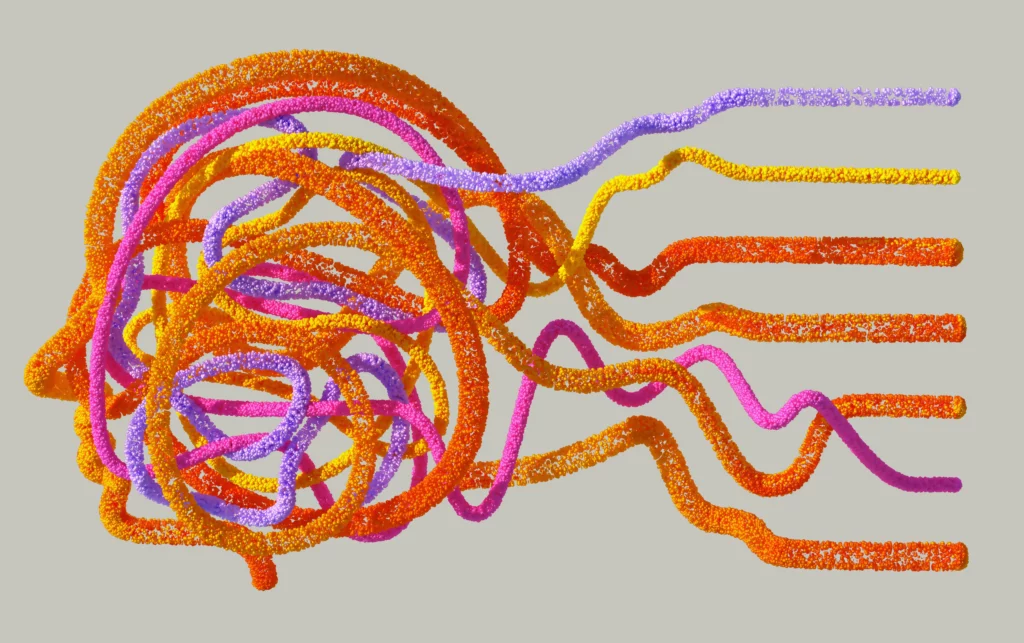
Beyond the areas above, AI agents are becoming the backbone of automation in many other fields:
Human Resources
AI agents assist the HR teams by automating recruiting and employee support processes. They are able to sort resumes and prioritize job applicants within seconds seeking the most suitable candidates according to the company requirements. After new employees are recruited, AI agents help them during onboarding: creating accounts, booking training, and answering typical HR questions. This accelerates the recruitment process and enhances the experience of the new hire. Firms that apply AI in HR have recorded increased productivity and an easier employee onboarding process. As a matter of fact, IBM has created HR-related AI agents (as part of its watsonx suite) capable of doing everything, including vacation requests and training sessions organization.
Research and Development (R&D)
AI agents are used to speed up research by scientists and engineers. In R&D, they can automatically collect information in thousands of papers, generate hypotheses, and even conduct virtual experiments. During one of the seminars, 87 percent of senior R&D staff members claimed that agentic AI would have a positive impact on the way R&D decisions are made. An example of this is Microsoft AI agent, Discovery, which assists researchers in sorting through complicated data and has resulted in discoveries, such as new battery materials that are discovered much quicker than conventional techniques. They can crunch the heavy data and simulation, freeing human researchers to do the creativity and results interpretation, accelerating innovation in everything, including chemistry and engineering.
Supply Chain and Logistics
The AI agents are streamlining the supply chains by automating inventory and route planning. They use supply and demand statistics to automatically order stock on just-in-time basis, avoiding under-stocking or over-stocking. Logistics agents are able to plan delivery routes of fleets of vehicles, and in real-time make adjustments due to traffic or weather to make sure that deliveries are made on time. These agents have begun to be used by retailers and manufacturers to minimize manual planning. The result is leaner operations goods move quicker and with fewer wastes. Other businesses have claimed to save a lot of money in fuel and warehouse expenses due to AI-based route optimization and inventory management.
Government and Smart Cities
The city governments are trying AI agents to enhance the civic services. As an example, traffic flow can be controlled by AI agents that change the traffic light patterns dynamically, depending on real-time data, and reduce congestion. Others control energy consumption in intelligent buildings, automatically reducing power when it is not in use and reducing municipal energy expenses. It is worth noting that the Singapore government has already introduced a range of AI agents to the sphere of public services, including chatbots that help citizens to receive the services of the government and systems that collect urban data to improve city planning. The AI agents are the digital civil servants who work behind the scenes as cities become smarter to ensure that everything is running smoothly.
Adoption Trends and the Future of AI Agents
The adoption of AI agents is growing at an exponential rate. Businesses large and small are exploring how these autonomous systems can give them an edge. According to KPMG research, 88% of organizations are either exploring or piloting AI agents in their operations. Over half of companies worldwide are actively researching how to apply AI agents, and more than a third have started real-world experiments with them. This means nearly everyone is at least considering AI agents, and a significant chunk have moved into action. In fact, 12% of companies have already deployed AI agents at scale as of the latest surveys. That number is expected to rise quickly in the next few years.

Looking ahead, industry analysts predict that AI agents will become even more ubiquitous. Deloitte estimates that by 2027, half of all enterprises will have AI agents deployed in some form, up from roughly a quarter in 2025. The market size projections mirror this optimism. As noted, the global AI agents market could reach around $47 billion by 2030. Other forecasts are even bolder – some suggest the market might exceed $200 billion by the mid-2030s as capabilities expand. This growth is fueled by continuous improvements in AI technology (especially in natural language processing and machine learning) and the falling barriers to entry. It’s becoming easier for even non-tech companies to implement AI agents, thanks to many off-the-shelf platforms and tools that have appeared.
Challenges
But as we move towards this automated future, we must remember that we should be cautious of challenges. Most scholars note that the current AI agents are still in their infancy. They are strong in the case of small tasks, but not omnipotent and as flexible as a human being. As we have observed, there are still Fortune 500 companies that are wary, particularly of strategic or creative work that needs human judgment.
The privacy of data, ethical applications, and the unpredictability of the behavior that AI may occasionally demonstrate are also the issues of concern. Businesses are responding by putting up safeguards. As an example, 29 percent of the companies require human supervision of any decisions made by an autonomous AI agent. Approximately, one out of every three companies does not allow AI agents to access sensitive data unless there is a person in the loop. These measures indicate a tendency towards an augmented approach, where the AI agents are used to support humans, not to fully substitute them in the critical areas.
Despite these precautionary measures, the trend is evident. AI agents are progressively becoming the backbone of the contemporary automation. By 2027, they will be capable of performing between 15-50 percent of business activities (depending on the industry and the complexity of the task). That distance can be extended with the improvement in technology. We can expect AI agents to become more reasonable, more transparent in their decision-making processes, and have more safety mechanisms to make sure that they work towards human values and objectives. The coming years are going to be an exciting period when collaborating with AI agents will be as natural as using computers or the internet.
Designveloper – Your Partner in AI and Automation
At Designveloper, we understand the immense potential of AI agents and have made it our mission to help businesses harness that power. We are a leading web and software development company in Vietnam, with over a decade of experience delivering top-notch technology solutions. Since our founding in 2013, we’ve grown into a team of 100+ skilled professionals covering a wide range of expertise. Our developers, designers, and engineers have delivered more than 100 successful projects worldwide, across the United States, Europe, Asia, and beyond. We take pride in having 50+ long-term clients who trust us to turn their bold ideas into reality.
Our Services
Our services span the full spectrum of modern development, from web and mobile app development to UI/UX design and enterprise software. Notably, we have strong expertise in AI development and automation solutions. Our team has built and integrated AI-powered features such as intelligent chatbots, voice assistants, and predictive analytics into client projects. We have firsthand experience using AI agents to streamline operations – for example, creating custom chatbot systems that handle customer inquiries or implementing AI-driven modules in software to automate data processing tasks. These solutions have helped our clients save time, cut costs, and deliver better experiences to their users.
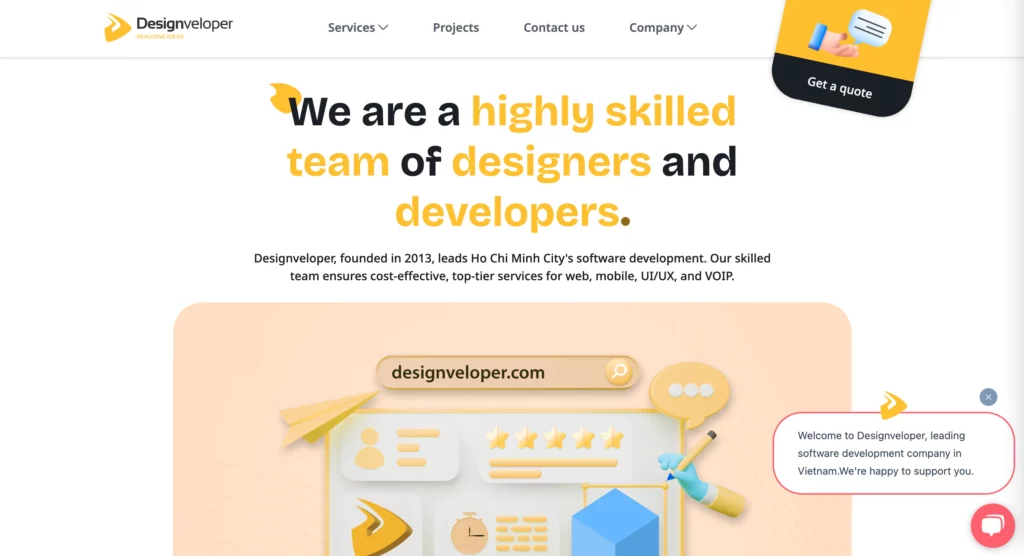
When you partner with Designveloper, you get a team that stays at the forefront of AI trends and technologies. We continually update our skill set with the latest in machine learning, natural language processing, and AI frameworks. In fact, Designveloper offers specialized services in areas like Generative AI and AI chatbot integration to ensure our clients can leverage cutting-edge innovations. We approach each project with a problem-solving mindset – our goal is not just to deploy technology, but to truly solve your business challenges in the most efficient way. That means if an AI agent can take over a repetitive workflow and make it faster or more reliable, we will make it happen with a tailor-made solution.
Our Process
Being a client-centric company, we work closely with you at every step. Our process typically starts with understanding your needs and identifying opportunities where AI and automation can deliver the most value. Then, our experts design and develop the solution, whether it’s a standalone AI-driven application or an AI component added to your existing system. We follow agile methodologies to keep you in the loop, and we iterate based on your feedback. This collaborative approach has earned us praise for effective communication and high-quality results (our clients have rated us 4.9/5 on platforms like Clutch for our delivery and professionalism). More importantly, it has led to tangible success stories – from a healthcare platform where our work improved user engagement and cut bounce rates by 35%, to enterprise systems that support thousands of concurrent users seamlessly.
Designveloper is not just about coding; we are about innovation and partnership. We view AI agents and automation as tools to elevate your business, and we have the experience to implement them responsibly and effectively. Our team keeps ethical AI practices in mind, ensuring that any AI features we build are transparent and aligned with your users’ trust. Whether you’re looking to build a smart customer service bot, automate your internal workflows, or create a sophisticated AI-driven product, we have the expertise to guide you from idea to implementation. We’ve done it for startups and large enterprises alike, and we’re excited to do it for you.
Conclusion
The current world is quickly becoming centered on the use of AI agents as a key to automation. They unite the power to sense, to choose, to act, which enables businesses to act quicker and wiser. We have already observed how these agents enhance customer service, optimize finances, help in healthcare, secure IT systems, etc. The figures and illustrations leave no doubt that AI agents are not a mere buzzword but a viable technology that brings actual value. The adoption is increasing and every year, these agents are taking up an increasingly higher proportion of tasks in industries.
The adoption of AI agents may result in massive efficiency and productivity increases and new functions that distinguish businesses. However, it is also crucial to do it with caution – to incorporate AI agents in a manner that does not undermine human capabilities and preserves trust and transparency. By doing it right, businesses will have the best of both worlds: the endless accuracy of AI and the human imagination and control.
When you think of applying AI agents to your organization, keep in mind that the right expertise on your side is all you need. It could be a selection of the right use case, training an AI model, or incorporating the agent into your workflow, but professional advice will make it a success. Designveloper is here to guide that way. We are experienced and passionate enough to guide you to use the AI agents to your advantage and make the idea of modern automation a reality in your business. The age of automation based on AI is upon us and the companies that learn and use AI agents today will dominate their markets tomorrow.






Read more topics
You may also like



















